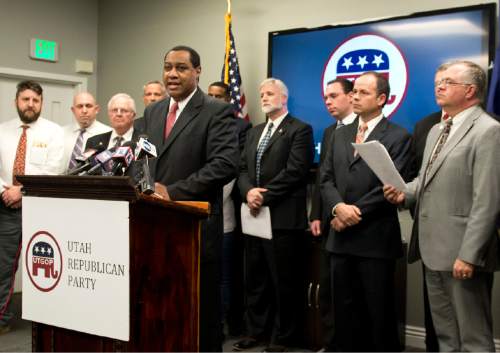This is an archived article that was published on sltrib.com in 2016, and information in the article may be outdated. It is provided only for personal research purposes and may not be reprinted.
When it comes to democracy, even the small-d kind, leaders of the Utah Republican Party often seem to want to see as little of it as possible.
Democracy is, after all, often messy, unpredictable and hard to control. That's bad, the official GOP thinking went, because it takes power away from the tiny number of people who have the time and devotion to participate in the king-making caucus and convention system.
But just the other day the party's central committee rightly bowed, if not to democracy, then to reality. Party bosses announced that they would cease their legal battle to stop the implementation of a 2014 state law that opens up the political process to more people.
Senate Bill 54 allows would-be candidates who want to run on the Republican, or Democratic, line on Utah ballots to either stick with the old caucus/convention system, get on the primary ballot by gathering signatures on a petition, or both.
That law is a compromise with a group of Utah political activists, including many seasoned Republicans, who see the disorder of democracy as a good thing because it places more power where it belongs, in the hands of the electorate generally.
Even though it is pro-democracy, the initiative called Count My Vote was anything but anti-Republican. It was, rather, a recognition that the body politic of Utah is growing and becoming more diverse.
For that party, or any party, to reflect and serve that new population, the Count My Vote leaders reasoned, it must reach out to welcome the contributions, and consider the views, of as many people as possible.
Given the weight of tradition, organization and fund-raising that exists in Utah, it is highly likely that the overwhelming majority of elective offices in the state will continue to be held by Republicans for the foreseeable future.
One-party government is always risky because its leaders become far too comfortable and inbred. That risk is reduced when the party is open to all who wish to identify with it, and thus encouraged to appeal to a broad base rather than a few true believers.
The party's lawsuits against SB54 lost at every level. So the central committee said it will give up on that effort and instead seek some small changes through the legislative process.
Improvements to any system are always welcome. But lawmakers should not fall for the party's ruse of wanting to take back the power to choose nominees when a primary has many candidates and none of them wins an outright majority.
Plurality winners in primaries, and in general elections, are a normal part of democratic governments, here and around the world. Abraham Lincoln and Harry Truman are among the presidents who managed only a plurality of the popular vote, and few would call those decisions erroneous or illegitimate.
Hopefully the Utah Republican Party has now given up its battle to control the state's electorate and will now be about trying to win it over by offering ideas that appeal to the broad base of our population.



